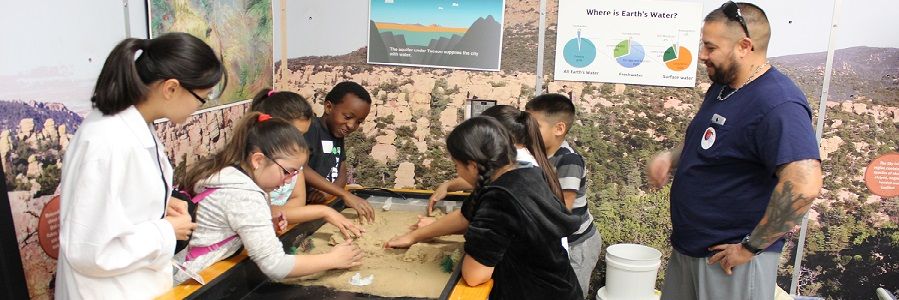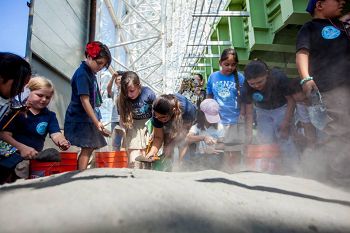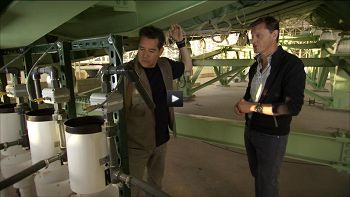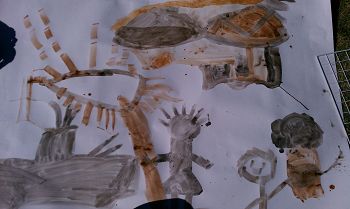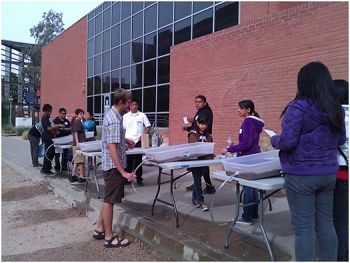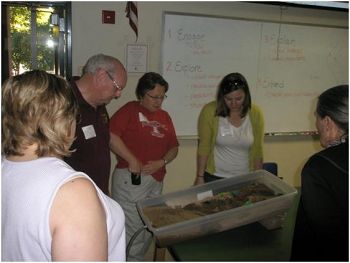K-12 Education
Fourth graders from Prince Elementary School learn about watersheds in the Earth Science Discovery program at the Flandrau Science Center & Planetarium. The program focuses on Critical Zone systems, cycles, and services, and the activities help students understand how people depend on the health of the Critical Zone.
The Earth Science Discovery program at University of Arizona focuses on the critical zone, because that is the part of the Earth where people live and that K-12 students can best relate to.
Learning Through Landscapes
A new opportunity for STEM learning within our local community is being led by a team of College of Science and the School of Geography and Development. We have created models of our Landscape Evolution Observatory (LEO), that we are calling LEitos, which mimic the Biosphere 2 flagship project in slope, aspect, and soil composition. Local elementary children are learning math, engineering, writing, and community building skills in the context of Earth science. The collaboration builds on the model School Garden Program, which similarly provides opportunity for U of A student engagement in science and education.
Read more from the Tucson Weekly >>
TV show on Landscape Evolution Observatory (LEO)
CZO Co-PI Peter Troch is Science Director of UA’s Biosphere 2. In this documentary made for middle school children, Peter meets with Geoff Notkin and discusses the Landscape Evolution Observatory at Biosphere 2, a model CZO “under glass” subjected to controlled environmental forcing.
Watch the clip from the STEM Journals website >>
Local School Outreach and Volunteering
Multiple students from the SCM-JRB CZO have been involved in local school activities over the past few years. Ph.D. candidate Rebecca Lybrand and graduate student Molly Holleran led soil demonstrations and hands-on activities in middle and high school classes at Presidio School. Also, as part of Sam Hughes Elementary Green Group’s Earth Week, Rebecca Lybrand, Molly Holleran, PI Craig Rasmussen, Ph.D. candidate Caitlin Orem, and undergraduate soil judging students volunteered as part of a soil painting activity where young students were introduced to soil properties and processes through soil colors and art.
Women in Science and Engineering (WISE) Mentor
The WISE Hybrid mentoring program offers mentor training for graduate students and professionals to become mentors to underrepresented female youth attending middle and high schools in Tucson, AZ. Rebecca Lybrand (Ph.D. candidate) is currently participating in this program where she uses hands-on science lessons and weekend field trips to include female youths in science and engineering discussions and activities.
American Indian Science and Engineering Society (AISES) Geosciences Outreach Project
Caitlin Orem (Ph.D. candidate) was recently involved in a research-based outreach program for American Indian high school students from Arizona. The event, Mother Earth and Her Ecosystems, included discussions about higher education opportunities, ongoing geosciences and CZO research, and life as a college student. The event also included poster presentations by high school students on water quality in their hometowns. Graduate student participants, organizers, and the public were included as part of the audience and judges. This event gave students the opportunity to present their scientific research and gain experience giving academic presentations.
AISES Geosciences Outreach Video >>
UA Geosciences Saturday Science Academy
This one-day weekend academy for middle-school students from the Tucson area occurs twice a year and is organized and implemented by Geoscience graduate students in coordination with UA Mathematics Engineering Science Achievement (MESA). For the past two years Ph.D. candidate Caitlin Orem has been involved with the planning and teaching of Saturday Academy. She has lead a field trip on debris flows in the Santa Catalina Mountains and taught stream table-based short lessons on local flooding, critical zone processes, and water and land management. Ph.D. candidate Rebecca Lybrand has also participated in soil texturing activities taught through the Saturday Academy. This is an ongoing outreach activity that has increased in size and impact over the past four years.
UA Mathematics Enginnering Science Achievement (MESA) and Lowell Institute of Mineral Resources (IMR) Geosciences Teacher Symposium
This symposium was held by the IMR group at UA to introduce middle-school science teachers to interactive and resourceful geoscience lessons. Ph.D. candidate Caitlin Orem participated by ncorporating topics such as critical zone processes, sedimentology, fluvial geomorphology, water and land use, economic resource deposition, and paleontology into a simple and flexible lesson and stream table set-up for teachers to implement in their classrooms.
Soil painting. Photo: Craig Rasmussen
Saturday science on the UA campus
Stream table set-up for teachers
Geoff Notkin visits Biosphere 2 LEO Experiment where he meets Science Director, Peter Troch.
Manzo Elementary visit at the LEO, photo by Robert Alcaraz, source Biosphere 2's Photos
News
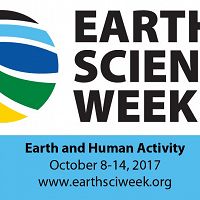
Earth Science Week 2017 Video Contest
15 Aug 2017 - For Earth Science Week 2017, the American Geosciences Institute invites you to enter the Earth Connections video contest. Submit a brief, 30-90...
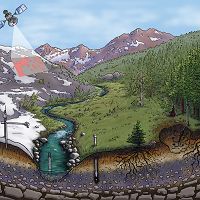
2017 CZO Webinar Series: Critical Zone and Society
06 Apr 2017 - 2017 CZO Webinar Series: Critical Zone and Society.
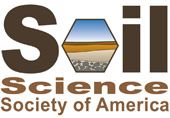
K-12 Soil Science Teacher Resources
24 Mar 2017 - The Soil Science Society of America (SSSA) is a professional scientific society, made up of soil scientists, educators, and consultants focused on...
Explore Further
